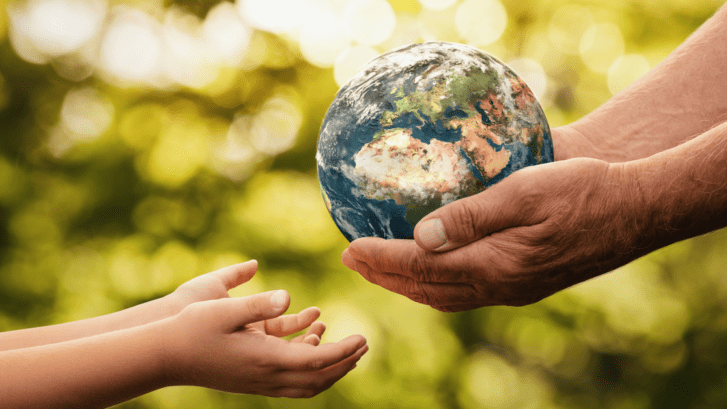Pope Francis has invited all people to reflect on the important work of building peace. In this month’s Contemplations on Peace & Justice, Fr. David Poirier, SA, Justice, Peace & Integrity of Creation Promoter (JPIC) for the Friars of the Atonement offers an ecumenical perspective on American politics.
Learn more about Fr. David Poirier, SA here.
An Inconvenient World
In his encyclical Laudato Sì Pope Francis asserts that all creation holds this world we inhabit in common and that we are all connected. Insofar as I am not the sole proprietor of the earth but must perforce share it with the rest of humanity (not to mention all the other living beings God created) I have an obligation to steward the earth and my place in it so as not to trespass on the rightful place of others around me. Contrary to Cain’s wishful thinking, I am my brother’s keeper. While I may glory in my personal freedom, the very fact that I am not alone in this world must remind me that my personal freedom does not trump the freedom of those around me.
While I have the freedom to smoke cigarettes those around me have a God-given right to breathe air free from my pollution. The freedom to extract minerals from the land I own does not mean that I am free to render local groundwater unfit for human consumption or the local air poisonous to breathe. The only absolutely unrestricted freedom belongs to God alone. All other rights and freedoms are relative to the rights and freedoms of others. Personal wealth, power or prestige (much though we would like to think otherwise) do not absolve us from respecting the legitimate rights and freedoms of others. Herein lies much of the friction that all too often erupts into conflict, local, national, or international, armed or otherwise. The mistaken notion that I am free to disregard or even trample the rights of others is at the heart of most human conflicts and is simultaneously at the heart of the ecological crisis looming on the horizon.
As the ice caps disappear and the glaciers recede at an alarming rate the sea level continues to rise, threatening to submerge a considerable portion of the dry land we live on. The island nation of Kiribati is in serious danger of sinking entirely beneath the waves and disappearing forever. With a population of some 117,000, it might be easy to think that relocation of such a small number of people would be a relatively simple matter. However, relocating the ten to fifty million Chinese who presently live less than six meters above sea level is another matter altogether, not to mention the additional ten to fifty million Indians and Bangladeshis who will lose everything to the sea.
Nor is the United States immune from the ravages of rising sea levels: the boroughs of Brooklyn and Queens will be largely gone while New Orleans and the Florida Keys will pretty much cease to exist. Coastal megacities worldwide are in danger. In Europe, the Netherlands would lose approximately 90% of its land area, and the list of threatened places is not in any danger of growing shorter. If sea levels rise by six meters by the year 2100, less than 80 years from now, more than 200,000,000 people will be flooded out.
The dire consequences of rising sea levels cited above are based only on a rise of six meters. Scientists studying previous periods of polar ice cap melt over millions of years suggest that the average minimum rise in these events is eighty meters. The mind boggles!
There is a great deal of disagreement on the root causes of the current rise in sea levels, but the fact of that rise is indisputable. As polar ice melts and ocean temperatures increase there is both more water to deal with and “bigger” water (seawater expands with increased temperature thus taking up more space.)
What has caused the warming of the earth’s atmosphere and oceans? Much ink has been spilled on that question these past few decades. Most scientists blame the increased rate of warming on greenhouse gasses. Minimizing the emission of these is a reasonable first step in slowing the rate of global warming. That reasonable first step, however, would impinge on the convenience of many in the so-called advanced societies. Producers of fossil fuels would lose trillions of dollars or more in revenue. Using public transport rather than one’s own personal vehicle is completely unthinkable for many. The other implications of habit changes that would have to occur to accomplish even this first step would be sizable and mightily resisted by most of us.
The notion that we may personally lose far more than the convenience of our cars should shake us out of our complacency. Perhaps I can dull my conscience to the point that I can ignore the impact of my freedom to choose on those less fortunate or those in far-off lands. However, when the realization dawns that my freedom to choose impacts and endangers those very freedoms and even my own existence, it is time to take serious steps, no matter how inconvenient.

